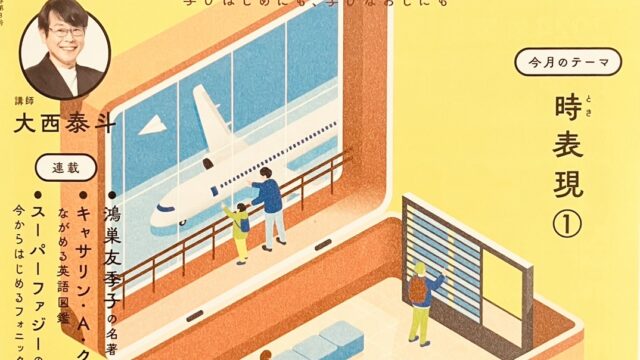【ラジオ英会話】Lesson 142 時表現の役割②命令文のバリエーション – November 5 Tuesday, 2024
November 5 Tuesday, 2024
Lesson 142 時表現の役割②命令文のバリエーション
★Opening
R: Hey everyone. This is Akino Roza. I think it was a mistake to have Onishi sensei do this opening today.
D: Hey hey hey! He nice, and I’m David Evans.
☆Words & Phrases
Commander, we need to be careful with that Kinzo person. – What do you mean?
**stranger:
**device:
We’re strangers here. I think it was a mistake to show him your device.
**to begin with:
Well, you shouldn’t have taken it out to begin with.
**blame for…:
Don’t blame me for something he did.
**afraid:
I’m sorry, Commander. I’m just afraid.
Don’t be afraid, Anton. I believe we can trust him.
☆Grammar and Vocabulary
I think it was a mistake to show him your device.
it ~ to… の形
it は「受ける」単語。心の中に浮かんだ状況を it で「受け」て、その内容を to以下で展開する形。
この文の it 以下は「間違いだったんです」から始まり「彼にあなたの装置を見せたのは、ね」とその内容を説明している。
You shouldn’t have taken it out to begin with.
should have+過去分詞「~すべきだった」
しなかったことに対する後悔を表すことのできる形。
この文は、shouldn’t なので「~すべきではなかった」と、してしまったことに対する後悔となる。

☆Target Forms
Don’t blame me for something he did.
命令文のバリエーション「禁止(~するな)」
Don’t を文頭につけたこの文が基本的な形
この「禁止」の命令のほか、さまざまな命令文のバリエーションを練習する
Practice
Don’t ~ は、You mustn’t ~ と同等の強い禁止表現です。
Don’t blame me for something he did.
① Don’t ever do it again.
Never do it again.
→ ever, never を使ったこの形は、Don’t ~ を使うよりも、さらに強い禁止
② Don’t you do it!
Don’t you ever come back!
→ you を使い対象を明らかにすることにより「非常に強い禁止」としている
③ You, stay where you are!
→ こちらも you を加えることによる強い命令
④ Do visit us more often.
Do be more careful.
→ 動詞の前に do を置いて強調する形
He does love me.
と、通常の文でも見られる強調の方法
★Practice
R: Okay guys. Today we are doing「命令文」again. I want you to keep in mind the strong feeling when you practice. Especially for the sentences that use “don’t” and also for the ones that use “do.” All right? So, repeat after us.
D: That’s right everyone. Here we go,
R:
– Don’t ever do it again.
– Never do it again.
D: All right. Let’s keep going,
– Don’t you do it!
– Don’t you ever come back.
Let’s go one more time,
– Don’t you ever come back.
R: Okay. Now, let’s practice the “you”,
– You, stay where you are!
D: All right. And now let’s put with some “do”. Okay?
– Do visit us more often.
And, here is one more,
– Do be more careful.
Unlock your potential.
R: Repetition is the key!
D&R: Great work.
☆Grammar in Action
①うわさを信じてはなりません。私はバンドを去ることを計画してはいません。
**rumor:
②ぜひお昼を食べていってください。昔話がとてもしたいので。
**catch up on old times:
③この2つの洗剤を決して混ぜないでください。非常に危険です、わかりましたか?
**cleaner:
**extremely:
★Ending
O: Humm…The example sentence was “Do stay for lunch”, but I’d rather stay for dinner.
D: Oh, speaking of which, sensei, would you like to come over for dinner?
O: Of course!!
R: David, never makes Onishi sensei with dinner. It’s extremely dangerous, got it?
D: Ah ha-ha! My bad!
November 5 Tuesday, 2024
Lesson 142 時表現の役割②命令文のバリエーション
(日本語訳・解説付き)
★Opening
R: Hey everyone. This is Akino Roza. I think it was a mistake to have Ohnishi sensei do this opening today.
D: Hey hey hey! He nice, and I’m David Evans.
☆Words & Phrases
Commander, we need to be careful with that Kinzo person. – What do you mean?
船長、私たちはあのキンゾウという人物には注意したほうがいいですよ – どういうこと?
※ that Kinzo person は「あのキンゾウという人」ということ。that は「あの」ですね
※What do you mean? は相手の真意を尋ねるフレーズです。文を丸ごと覚えておきましょう!
**stranger:(ある土地について)不案内な人
**device: 装置
We’re strangers here. I think it was a mistake to show him your device.
私たちは、ここでは異邦人なのです。彼にあなたのスマホを見せたのは間違いだったと思います。
※device が「スマホ」と訳されているのは、前回のお話でメーガンが取り出したスマホをキンゾウが奪って見てしまったからですね!「スマホ」を device と言い換えています
**to begin with: そもそも、第一に
Well, you shouldn’t have taken it out to begin with.
いや、そもそも、あなたはそれを取り出すべきではなかったんです。
**blame for…: ~を…のことで非難する
Don’t blame me for something he did.
彼がしたことで私を責めないでちょうだい。
※ me と he を強調して発音されていました!
**afraid: 恐れて、心配して、怖がって。残念ながら(~しなければならないと思う)
I’m sorry, Commander. I’m just afraid.
すみません、船長。私はただ、心配しているだけなんです。
Don’t be afraid, Anton. I believe we can trust him.
心配いらないわ、アントン。彼は信頼できると思うわ。
※I believe は I think(私は思う)よりも少しキッチリしていて、(確信度が)強い感じのする表現です
☆Grammar and Vocabulary
I think it was a mistake to show him your device.
私は、彼にあなたの装置を見せたのは間違いだったと思います。
it ~ to… の形
it は「受ける」単語。心の中に浮かんだ状況を it で「受け」て、その内容を to以下で展開する形。
この文の it 以下は「間違いだったんです」から始まり「彼にあなたの装置を見せたのは、ね」とその内容を説明している。
You shouldn’t have taken it out to begin with.
そもそも、あなたはそれを取り出すべきではありませんでした。
should have+過去分詞「~すべきだった」
しなかったことに対する後悔を表すことのできる形。
この文は、shouldn’t なので「~すべきではなかった」と、してしまったことに対する後悔となる。

☆Target Forms
Don’t blame me for something he did.
彼がしたことで私を責めないで。
命令文のバリエーション「禁止(~するな)」
Don’t を文頭につけたこの文が基本的な形
この「禁止」の命令のほか、さまざまな命令文のバリエーションを練習する
Practice
Don’t ~ は、You mustn’t ~ と同等の強い禁止表現です。
Don’t blame me for something he did.
① Don’t ever do it again.
Never do it again.
二度とそれをするな。
→ ever, never を使ったこの形は、Don’t ~ を使うよりも、さらに強い禁止
② Don’t you do it!
お前はそれをやってはダメだ!
Don’t you ever come back!
お前は二度と戻ってくるな!
→ you を使い対象を明らかにすることにより「非常に強い禁止」としている
③ You, stay where you are!
君、その場にいなさい!
→ こちらも you を加えることによる強い命令
④ Do visit us more often.
ぜひもっと頻繁に来てください。
Do be more careful.
もっと注意しなさい。
→ 動詞の前に do を置いて強調する形
He does love me.
彼は実際私が大好きなのよ
と、通常の文でも見られる強調の方法
★Practice
R: Okay guys. Today we are doing「命令文」again. I want you to keep in mind the strong feeling when you practice. Especially for the sentences that use “don’t” and also for the ones that use “do.” All right? So, repeat after us.
D: That’s right everyone. Here we go,
R:
– Don’t ever do it again.
– Never do it again.
D: All right. Let’s keep going,
– Don’t you do it!
– Don’t you ever come back.
Let’s go one more time,
– Don’t you ever come back.
R: Okay. Now, let’s practice the “you”,
– You, stay where you are!
D: All right. And now let’s put with some “do”. Okay?
– Do visit us more often.
And, here is one more,
– Do be more careful.
Unlock your potential.
R: Repetition is the key!
D&R: Great work.
☆Grammar in Action
①うわさを信じてはなりません。私はバンドを去ることを計画してはいません。
Don’t believe the rumors. I’m not planning to leave the band.
**rumor: うわさ
②ぜひお昼を食べていってください。昔話がとてもしたいので。
Do stay for lunch. I’d love to catch up on old times.
**catch up on old times: 昔話をする
③この2つの洗剤を決して混ぜないでください。非常に危険です、わかりましたか?
Never mix these two cleaners. It’s extremely dangerous, got it?
**cleaner: 洗剤
**extremely: 極端に、非常に
★Ending
O: Humm…The example sentence was “Do stay for lunch”, but I’d rather stay for dinner.
うーん…例文は「ぜひお昼も食べていって」だったけど、僕はむしろ夕食がいいな。
D: Oh, speaking of which, sensei, would you like to come over for dinner?
あ、それで思い出したんだけど、先生、夕食にうちに来ませんか?
O: Of course!!
もちろん!!
R: David, never makes Onishi sensei with dinner. It’s extremely dangerous, got it?
デイビッド、先生と夕食はやめておきなよ。すっごく危険だからね、わかった?
D: Ah ha-ha! My bad!
ははっ、僕のミスだね!
※My bad. は、カジュアルな謝罪表現です。日本語だと「ごめん!」「悪かった!」に近いニュアンスです。ちょっとしたことなら、I’m sorry. より、My bad. を使った方がいいですね!
名古屋駅前【AI×英会話】名古屋BEGビジネス英会話ジム – AIで鍛えるビジネスで使える英語力。仕事も日常も、一歩先へ。
営業時間:平日 9:00~22:00 土曜日 9:00~19:00(日祝休み)
〒450-0002 愛知県名古屋市中村区名駅2丁目40-16 名駅野村ビル 5階



